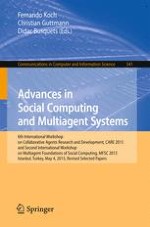2015 | OriginalPaper | Buchkapitel
The Effects of Temperament and Team Formation Mechanism on Collaborative Learning of Knowledge and Skill in Short-Term Projects
verfasst von : Mehdi Farhangian, Martin Purvis, Maryam Purvis, Tony Bastin Roy Savarimuthu
Erschienen in: Advances in Social Computing and Multiagent Systems
Aktivieren Sie unsere intelligente Suche, um passende Fachinhalte oder Patente zu finden.
Wählen Sie Textabschnitte aus um mit Künstlicher Intelligenz passenden Patente zu finden. powered by
Markieren Sie Textabschnitte, um KI-gestützt weitere passende Inhalte zu finden. powered by
